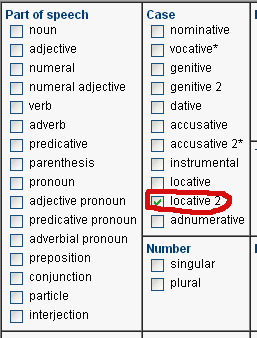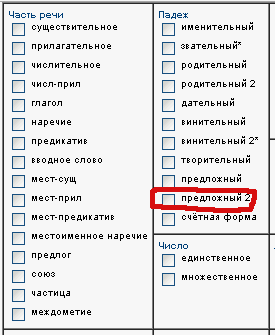I know one already:
in the garden - в саду
in the forest - в лесу
in the nose - в носу
in the heaven - в раю
in the year - в году
in the cupboard - в шкафу
in snow - в снегу
in delirium - в бреду
in common use, widespread - в ходу
in the brain - в мозгу
in ice - во льду
in the mouth - во рту
in the formation - в строю
We study 6 cases at school, and things like this we call exceptions. However, this is locative case from old Russian. Did you notice all these nouns describe where, they point at the location of object?
And a tricky example:
В "Вишнёвом саде" Чехов рассказывает о ...
Locative forms are not used when the noun is a part of a name of a work.
If your understanding of Russian permits, you may read an article about other "hidden" cases that are often considered exceptions.
The ones that come first to my mind (apart from already mentioned) are:
в aду (in Hell)
на балу (at the dance party)
на бегу (while running)
на берегу (on the shore)
на боку (on the side)
в бору (in the pine forest)
в бою (in the battle)
на валу (on the bank)
на возу (on the cart)
в/на глазу (in/on the eye)
в году (in the year)
на [своём] горбу (on [somebody's own] hump, used figuratively = bring something with your own muscles without any help of mechanisms or other people)
на Дону (in the Don region)
в жиру (in the fat)
в зобу (in the craw)
на кону (at stake)
в/на краю (in the region/on the edge)
в кругу (in the circle, mostly used figuratively f.e. в кругу друзей - among friends)
на лету (while flying, mostly used figuratively = doing something fast and at the same time with something else)
во/на льду (in/on the ice)
в мозгу (in the brain, but anatomically speaking we say "в мозге")
на мосту (on the bridge)
на мысу (on the cape)
в/на носу (in/on the nose)
на плаву (afloat)
в плену (in captivity)
в/при полку (in/attached to the regiment)
в порту (in the port)
в поту (all over in sweat)
в раю (in heaven, in paradise)
во рту (in the mouth)
на скаку (while riding)
на слуху (if a person is на слуху, it means he is talked about a lot)
в/на снегу (in/on the snow)
в строю (in the formation, in the line-up)
в/на углу (in/on the corner)
в хлеву (in the barn)
в/на ходу (the one which is being commonly used/while moving)
в/на шкафу (in/on top of the wardrobe)
There are more of them, it's rather hard for me to remember more :D.
I added some more examples of nouns ending with -у in the prepositional (aka locative) case to the Yellow Sky's answer (pending peer's review). There are many more of them still not mentioned.
In this answer I would like to concentrate on the phenomenon of such words, finding common patterns in them, and suggesting the ways of finding them instead of just listing them. Kind of following the Chinese proverb: Give a man a fish and you feed him for a day. Teach a man to fish and you feed him for a lifetime. :-)
I noticed that for all these words the following is true:
Correct me if I'm wrong but I think in the Old Russian almost all the nouns had such form. With time these forms started to be supplanted by more modern forms of prepositional (locative) case but some words resisted and are still keeping their old forms in certain meanings. This my hypothesis is confirmed by the fact that the words borrowed/created not very long time ago do not have such forms. F.e. compare мёд (old word) and йод (more new). It is possible to say выдержанный в меду, but it will be выдержанный в йоде - not йоду for йод.
According to Zalizniak's dictionary this phenomenon is called the "2-ой предложный падеж" (second prepositional case). Russian National Corpus website calls it "предложный 2", or, in their English version: "locative 2". (Interesting is that locative - not prepositional - is used as the translation of word предложный for grammatical cases. You can see the "official" list of Russian grammatical cases by clicking "выбрать"/"select" close to the "Грамм. признаки"/"Gramm. features" text box).
All the words that can form locative 2 are marked with the sign П₂ in the Zalizniak's dictionary.
Here is the excerpt from П₂ definition by Zalizniak:
Помета П₂ (за которой может следовать в скобках предлог "в" или "на") - символ
наличия у данного слова особой формы так-называемого 2-го предложного падежа.
...
Помета П₂ означает, что у данного существительного в ед. числе после предлогов
"в" и "на", выступающих в одном из указанных ниже значений, употребляется особая форма,
отличная от обычного предложного падежа - так называемый 2-ой предложный падеж. Форма 2-го
предложного падежа ед. числа по буквенному составу равна форме Д. ед. того же слова, но
ударение в ней всегда на окончании. Примеры: "шкаф" (Д. ед. "шкАфу") - П₂ ед. "шкафУ";
...
See here, and here the original scanned pages.
One possibility is to open the online version of the Zalizniak's dictionary and scan it page by page searching for the mark "п(2)". (For example, look for word "сад" on the page references above). At least this is until a better (for our purposes) version of the online dictionary exists which would allow searching by marks. :-)
Another possibility for finding such words is by using the National Corpus. Click this; click on "select" close to "Gramm. features"; in the following popup check "locative 2".  ;
;  on the main page click the "search" button. In the results of search you will see the words in locative 2 case put in the context of their usage.
on the main page click the "search" button. In the results of search you will see the words in locative 2 case put in the context of their usage.
Masculine nouns that have locative:
снег в снегу о снеге
дым в дыму о дыме
хвост в хвосте о хвосте
лес в лесу о лесе
бор в бору о боре
бал на балу о бале
плац на плацу о плаце
ров во рву о рве
берег на берегу о береге
мир в миру о мире (here мир means "life outside church", in the meaning of peace and world, locative is not used)
стог в стогу о стоге
долг в долгу о долге
вид на виду о виде
пруд в пруду о пруде
день на дню о дне
нос в носу о носе
глаз в глазу о глазе
таз в тазу о тазе
паз в пазу о пазе
воз на возу о возе
ряд в ряду о ряде
век на веку о веке
строй в строю о строе
бред в бреду о бреде
ветер на ветру о ветре
мел в мелу о меле
тыл в тылу о тыле
пол на полу о поле
пыл в пылу о пыле
бой в бою о бое
ход на ходу о ходе
жар в жару о жаре
стыд в стыду о стыде
быт в быту о быте
пир на пиру о пире
рот во рту о рте
пар на пару о паре
дух на духу о духе
мост на мосту о мосте
борт на борту о борте
год в году о годе
час в часу о часе
бег на бегу о беге
лёт на лету о лёте (Prepositional is not generally used)
порт в порту о порте
аэропорт в аэропорту об аэропорте
пот в поту о поте
жир в жиру о жире
род в роду о роде
сад в саду о саде
зад в заду о заде
шкаф в шкафу о шкафе
полк при полку о полке
мозг в мозгу о мозге
лёд на льду о льде
сук на суку о суке
раз на разу о разе
рай в раю о рае
угол в углу об угле
бор в бору о боре
свет на свету о свете
вес на весу о весе
дом на дому о доме
гроб в гробу о гробе
чад в чаду о чаде
хлев в хлеву о хлеве
край на краю о крае
вал на валу о вале
повод на поводу о поводе
луг на лугу о луге
бок на боку о боке
мех в меху о мехе
пух в пуху о пухе
пост на посту о посте
скок на скаку о скоке (Prepositional is not generally used)
ад в аду об аде
плот на плоту о плоте
хмель во хмелю о хмеле
верх на верху о верхе
бас на басу о басе
спирт на спирту о спирте
кон на кону о коне
квас на квасу о квасе
яр в яру о яре
Masculine proper nouns:
Крым в Крыму о Крыме
Клин в Клину о Клине
Дон на Дону о Доне
Feminine nouns that have locative (difference in the stress):
тень в тенИ о тЕни
грязь в грязИ о грЯзи
пыль в пылИ о пЫли
грудь в грудИ о грУди
сень в сенИ о сЕни
ночь в ночИ о нОчи
даль в далИ о дАли
мель на мелИ о мЕли
сеть в сетИ о сЕти
печь в печИ о пЕчи
кровь в кровИ о крОви
ось на осИ об Оси
рысь на рысИ о рЫси
связь в связИ о свЯзи
тишь в тишИ о тИши
кровь на кровИ о крОви
дверь на дверИ о двЕри
Feminine nouns that have locative forms in plural (difference in the stress and е-ё):
слЁзы в слезАх о слЁзах
сОпли в соплЯх о сОплях
слЮни в слюнЯх о слЮнях
Ясли в яслЯх о Яслях
слАсти в сластЯх о слАстях
стрАсти в страстЯх о стрАстях
There are quite a few of these. Some of them have become optional. Some are only used in one particular meaning. The lists above don't always state the meaning restrictions. I'm trying to set out the meanings here. It should be noted, if not noted above, that the locative is always a stressed ending. It is в глазУ, в снегУ, в этом годУ. These are from my personal vocabulary files (my vocab spreadsheet), not from Zalizniak.
в котором часу? - at what time?
ввечеру (outdated and written as one word) - in the evening
в миру - where it means "in the secular world", as opposed to in a monastery
на виду у всех - visible in front of everyone
в свету/на свету - in the physical light (в свете = in the light of, reaching a conclusion in the light of something; на свете, in the world)
стоять на ветру - to stand in the wind
на каждом шагу - at every step
в ряду - in a row (в ряде - in a series)
на счету - in your account
в чаю - in the tea (rare or low colloquial, usually в чае)
в цвету - in blossom
на полу - on the floor
у меня в роду были русские - I have Russians in my family/in my family tree
как на духу - honestly, as if confessing to a priest
в газу - in the gas
в шуму - in the noise
в следу - on track
идти по поводу у кого-либо: to be led by the nose by someone
на весу - suspended in mid-air
в быту - in daily life
бой в Крыму, всё в дыму - total confusion and disarray
на лбу - on the forehead
в долгу у кого-либо - in debt to someone
варить на пару - to steam
в посту - on a (Lenten) fast
на складу - in storage (non-standard)
в отпуску - on leave
на верху блаженства - in seventh heaven
на лугу - in the meadow
одной ногой в гробу - one foot in the grave (in the coffin)
жить на подножном корму - to live off the land
на борту - on board a ship
в цеху - on the shop floor
во хмелю - drunk (from the locative of "hops")